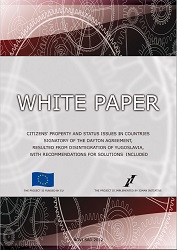WHITE PAPER - Citizens' Property and Status Issues in Countries signatory of the Dayton Agreement, resulted from Disintegration of Yugoslavia
WHITE PAPER - Citizens' Property and Status Issues in Countries signatory of the Dayton Agreement, resulted from Disintegration of Yugoslavia
Author(s): Ratko Bubalo, Boris Knežević, Branislav Radulović, Srđan Arnaut
Subject(s): Constitutional Law, Civil Law, Wars in Jugoslavia
Published by: Centar za regionalizam
Keywords: refugees; displaced persons; Dayton Agreement; Western Balkans;
Summary/Abstract: In the framework of the Igman Initiative's further strategy, program for the following period includes a number of important activities related to finding permanent solutions for citizens' property and status issues in countries signatory to the Dayton Agreement. Igman Initiative upholds the view that only efficient addressing of certain outstanding issues between Dayton Agreement countries may speed‐up further normalization of their relations and EU integration processes. At the beginning of the past decade, initiation of the process of democratization of the signatory countries of Dayton Agreement set off a number of initiatives aimed at addressing numerous problems in mutual relations. In many spheres, legislation was harmonized and reconciled with European legislation, a number of bilateral agreements were signed and a considerable number of outstanding issues were approached in practice. It was a contribution to amendment and improvement of mutual relations and cooperation. In spite of those efforts, a number of issues remain open, including citizens' status and property issues. There are several reasons for this state of affairs. First comes from the fact that these issues are closely connected with the issues concerning refugees and displaced persons, for which sufficient political will is lacking. This project is being implemented in the midst of significant ongoing regional initiatives aimed at finding permanent solutions for citizens of the signatory countries of Dayton Agreement, who were victims of gravest and widespread forms of violation of human rights, in particular refugees and displaced persons. Upon the initiative launched by European Commission, OSCE and UNHCR, the representatives of countries in this region: Bosnia and Herzegovina, Croatia, Serbia and Montenegro, have adopted the Sarajevo Declaration in January 2005, and took on an obligation to facilitate the return and local integration of refugees and displaced persons in their countries through joint activities and mutual cooperation. However, in spite of additional incentives and initiatives from the international community, not much progress was made in implementation of the Sarajevo Declaration, which had aimed to finalize the process of return of refugees in the region by the end of 2006.
- Print-ISBN-13: 978-86-86145-18-5
- Page Count: 77
- Publication Year: 2012
- Language: English
- eBook-PDF
- Table of Content
- Introduction

